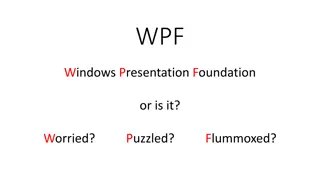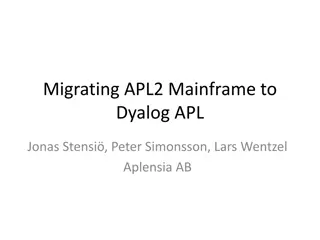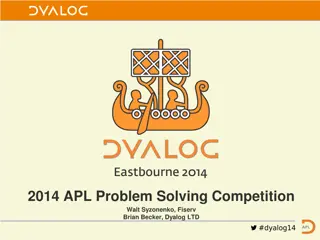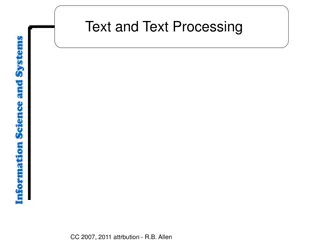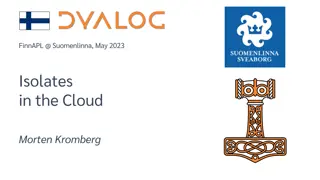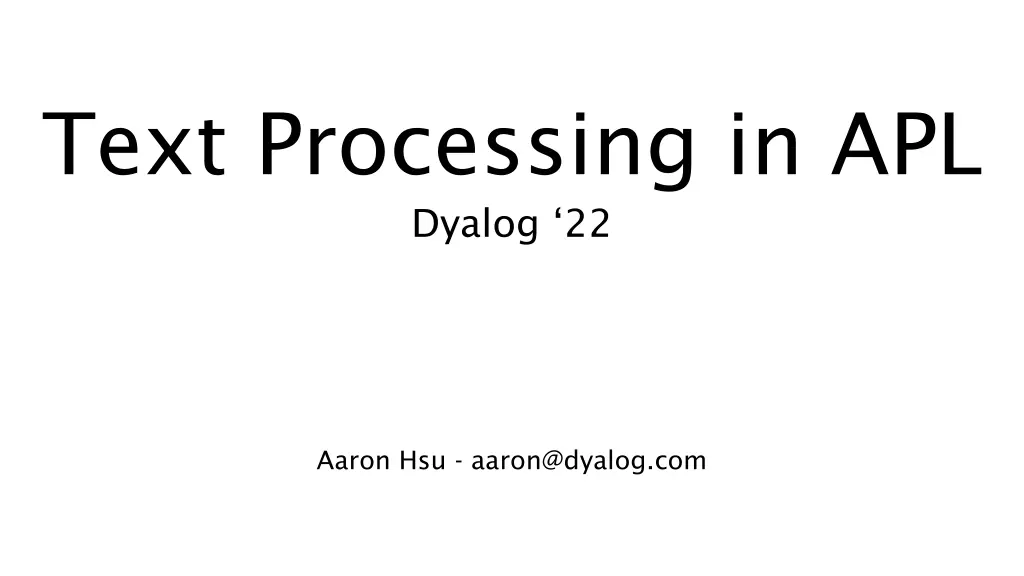
Unlocking APL's Text Processing Capabilities: Explore Beyond Numbers
Delve into the world of text processing in APL with Aaron Hsu. Discover how APL, known for its prowess with numbers, extends its capabilities to handle textual data. Explore topics ranging from grammars and parsing to usability and error handling. Uncover the potential of APL beyond numeric operations and embrace its versatility in handling textual information.
Download Presentation

Please find below an Image/Link to download the presentation.
The content on the website is provided AS IS for your information and personal use only. It may not be sold, licensed, or shared on other websites without obtaining consent from the author. If you encounter any issues during the download, it is possible that the publisher has removed the file from their server.
You are allowed to download the files provided on this website for personal or commercial use, subject to the condition that they are used lawfully. All files are the property of their respective owners.
The content on the website is provided AS IS for your information and personal use only. It may not be sold, licensed, or shared on other websites without obtaining consent from the author.
E N D
Presentation Transcript
Text Processing in APL Dyalog 22 Aaron Hsu - aaron@dyalog.com
Is APL only about numbers?
Sharp Corners
Context- sensitive
Seq S1 S2 Choice A | B
Recursive Descent
S | (char | Par | Brk) S Par ( S ) Brk [ S ]
Errors AST Creation Auxiliary Data
S | (char | Par | Brk) S Par ( S ) Brk [ S ]
S (char | Par | Brk) S | Par ( S ) Brk [ S ]
S (Par | Brk | char) S | Par ( S ) Brk [ S ]
Easy to Explode, Hard to Catch
Interpreter Overhead
old{OP.ps SRC t0009} new {codfns.PS SRC t0009} cmpx new old new 2.4E 2 | 0% * old 1.5E0 | +6151%
Data-parallel Idiomatic Flexible/Scalable
Error Handling Context Sensitivity
Linear Data-flow Micro pass
Linearize the Grammar Dependencies
S (Par | Brk | char) S | Par ( S ) Brk [ S ]
x'kdfl(kkdf(ksdk[ksd(ksfl]ksk)ksd))' d + (o x '([')+-c x ')]' 2{p[ ] [ ]} 1 d p d x, x[p] kdfl(kkdf(ksdk[ksd(ksfl]ksk)ksd)) kdfl((((((((((([[[[((((([[[[((((( '()' .=c x[p]x 0 0 1 1 codfns.(dwv pp3) p
: 2O PEG'Mop Pmop , Afx PEG'Pdop1 dop1 : 3P ' PEG'Dop1 Pdop1 , Afx PEG'Pdop2 dop2 : 3P ' PEG'Vop Atom , Pdop2 , Afx PEG'Pdop3 dop3 : 3P ' PEG'Dop3 Pdop3 , Atom : 7O PEG'Bop rbrk , Ex , lbrk , (4 Lbrk) , Afx PEG'JotDP dot , jot : 3P PEG'JotDot Fnp , JotDP PEG'Fop Fnp , (Dop1 | Dop3 ?) : MkAST PEG'Afx Mop | JotDot | Fop | Vop | Bop ' PEG'Trn Afx , (Afx | Idx | Atom , ( ?) ?) : 5F PEG'Bind gets , Symbol [ ] : B ' PEG'Gets PEG'Mname Afx , (1 Name) : 4E Atn PEG'Ogets Afx , (3 Gets) : 2O ' PEG'Mbrk Ogets , Brk , (1 Name) : 4E (1 )Atn ' PEG'Mget Mname | Mbrk PEG'Bget 2 Gets , Brk , (1 Name) : 4E (1 )Atn ' PEG'ExHd Asgn | (1 Bind) | App , ? ' PEG'Ex IAx , ExHd ' : 8O ' : 5O ' ' : 5O ' ' : 2O ' ' : P{,'' ''}' ' ' : MkAST '
Fn{a(i d) 0=a:0 (i d) 0= ss (4 z) m (((N 'F')=1 ) 1=2 ) z a:0(, z) (i d) 0<c r 0,pi r ps Fa ss, d:pi ps 0(, ( z)(( ) @{m}) (m 0 z)+@0 1 r) (i d)} FnType { 2,3 4 1 ( 1, 1 )[' ' ' ' ]} PEG'ClrEnv (Alp[ 1]),(Alp,Alp[ 1]),(Omg[ 1]),(Omg,Omg[ 1]) ' PEG'Fax lbrc , (Gex | Ex | Fex Stmts rbrc) Fn PEG'FaFnW Omg[1] , Fax [] ' PEG'FaFnA Omg[1] , (Alp[1]) , Fax [] ' PEG'FaFn FaFnW | FaFnA PEG'FaMopV Alp,Alp[1] , FaFn [] ' PEG'FaMopF Alp,Alp[2] , FaFn [] ' PEG'FaMop FaMopV , (FaMopF ?) | FaMopF PEG'FaDopV Omg,Omg[1] , FaMop [] ' PEG'FaDopF Omg,Omg[2] , FaMop [] ' PEG'FaDop FaDopV , (FaDopF ?) | FaDopF PEG'Fa ClrEnv , (FaFn | FaMop | FaDop) [] ' PEG'Nlrp sep | rbrc Slrp (lbrc Blrp rbrc) ' PEG'Stmt sep | ( , (sep | lbrc) Nlrp) ' PEG'Stmts | ( Stmt , ) ' PEG'Ns nss , (Ex | Fex Stmts nse) , eot Fn : (FnType )F ' ' ' ' : ( 1+ )0F '
Compute parent vector from d Compute the nameclass of dfns Nest top-level root lines as Z nodes Wrap all dfns expression bodies Drop any Z nodes that are empty Parse :Namespace Parse guards Parse brackets and parentheses Parse ; Mark system variables Mark primitives Parse niladic tokens Unify atomic array values Mark bindable nodes Wrap bindings into B nodes Wrap functions as closures Link variables to their bindings Infer types of bindings Parse strands Parse [] operator Parse function expressions Parse assignments Parse expressions Simplify and Optimize the AST
Link variables to their bindings mk { [ ], n[ ]} _ { Link local variables with their local bindings vb[i] fb[fr rf mk i (t=V) vb= 1] vb[i] fb[fr rfn mk i (t=V) vb= 1] b vb[i i vb[i] 1] vb[i (rz[i]<rz[b]) (rz[i]=rz[b]) i b] 1 Mark free variables with their scope before binding lx[i (t=V) vb= 1] 1 Add free variables to closures i i k[rfn[i]] 0 ci p[rfn[i]] vb[i] ( p)+ i p, ci vb lx, ( ci) 1 0 rf rfn( ,I) ci t k n pos end( ,I) i i} {0= }
Link variables to their bindings mk { [ ], n[ ]} _ { Link local variables with their local bindings vb[i] fb[fr rf mk i (t=V) vb= 1] vb[i] fb[fr rfn mk i (t=V) vb= 1] b vb[i i vb[i] 1] vb[i (rz[i]<rz[b]) (rz[i]=rz[b]) i b] 1 Mark free variables with their scope before binding lx[i (t=V) vb= 1] 1 Add free variables to closures i i k[rfn[i]] 0 ci p[rfn[i]] vb[i] ( p)+ i p, ci vb lx, ( ci) 1 0 rf rfn( ,I) ci t k n pos end( ,I) i i} {0= }
Link variables to their bindings mk { [ ], n[ ]} _ { Link local variables with their local bindings vb[i] fb[fr rf mk i (t=V) vb= 1] vb[i] fb[fr rfn mk i (t=V) vb= 1] b vb[i i vb[i] 1] vb[i (rz[i]<rz[b]) (rz[i]=rz[b]) i b] 1 Mark free variables with their scope before binding lx[i (t=V) vb= 1] 1 Add free variables to closures i i k[rfn[i]] 0 ci p[rfn[i]] vb[i] ( p)+ i p, ci vb lx, ( ci) 1 0 rf rfn( ,I) ci t k n pos end( ,I) i i} {0= }
Link variables to their bindings mk { [ ], n[ ]} _ { Link local variables with their local bindings vb[i] fb[fr rf mk i (t=V) vb= 1] vb[i] fb[fr rfn mk i (t=V) vb= 1] b vb[i i vb[i] 1] vb[i (rz[i]<rz[b]) (rz[i]=rz[b]) i b] 1 Mark free variables with their scope before binding lx[i (t=V) vb= 1] 1 Add free variables to closures i i k[rfn[i]] 0 ci p[rfn[i]] vb[i] ( p)+ i p, ci vb lx, ( ci) 1 0 rf rfn( ,I) ci t k n pos end( ,I) i i} {0= }
Link variables to their bindings mk { [ ], n[ ]} _ { Link local variables with their local bindings vb[i] fb[fr rf mk i (t=V) vb= 1] vb[i] fb[fr rfn mk i (t=V) vb= 1] b vb[i i vb[i] 1] vb[i (rz[i]<rz[b]) (rz[i]=rz[b]) i b] 1 Mark free variables with their scope before binding lx[i (t=V) vb= 1] 1 Add free variables to closures i i k[rfn[i]] 0 ci p[rfn[i]] vb[i] ( p)+ i p, ci vb lx, ( ci) 1 0 rf rfn( ,I) ci t k n pos end( ,I) i i} {0= }
Compute parent vector from d Compute the nameclass of dfns Nest top-level root lines as Z nodes Wrap all dfns expression bodies Drop any Z nodes that are empty Parse :Namespace Parse guards Parse brackets and parentheses Parse ; Mark system variables Mark primitives Parse niladic tokens Unify atomic array values Mark bindable nodes Wrap bindings into B nodes Wrap functions as closures Link variables to their bindings Infer types of bindings Parse strands Parse [] operator Parse function expressions Parse assignments Parse expressions Simplify and Optimize the AST
Parse plural value sequences to A7 nodes i |i km 0<i p[i]( - , ) i t[p]=Z msk 1 1 . msk km (t[i]=A) (t[i] P V Z) k[i]=1 np ( p)+ ai i am 2> msk 0 p (np@ai p)[p] p, ai t k n lx pos end( ,I) ai t k n lx pos( @ai ) A 7( '')0(pos[i km 2< 0 msk]) p[msk i] ai[ 1++ km msk msk ~am]
Parse plural value sequences to A7 nodes i |i km 0<i p[i]( - , ) i t[p]=Z msk 1 1 . msk km (t[i]=A) (t[i] P V Z) k[i]=1 np ( p)+ ai i am 2> msk 0 p (np@ai p)[p] p, ai t k n lx pos end( ,I) ai t k n lx pos( @ai ) A 7( '')0(pos[i km 2< 0 msk]) p[msk i] ai[ 1++ km msk msk ~am]
Parse plural value sequences to A7 nodes i |i km 0<i p[i]( - , ) i t[p]=Z msk 1 1 . msk km (t[i]=A) (t[i] P V Z) k[i]=1 np ( p)+ ai i am 2> msk 0 p (np@ai p)[p] p, ai t k n lx pos end( ,I) ai t k n lx pos( @ai ) A 7( '')0(pos[i km 2< 0 msk]) p[msk i] ai[ 1++ km msk msk ~am]
Parse plural value sequences to A7 nodes i |i km 0<i p[i]( - , ) i t[p]=Z msk 1 1 . msk km (t[i]=A) (t[i] P V Z) k[i]=1 np ( p)+ ai i am 2> msk 0 p (np@ai p)[p] p, ai t k n lx pos end( ,I) ai t k n lx pos( @ai ) A 7( '')0(pos[i km 2< 0 msk]) p[msk i] ai[ 1++ km msk msk ~am]
Flexible Easy to grow
Avoids: Cognitive context-switching Domain segregation
Maps well to APL performance model





